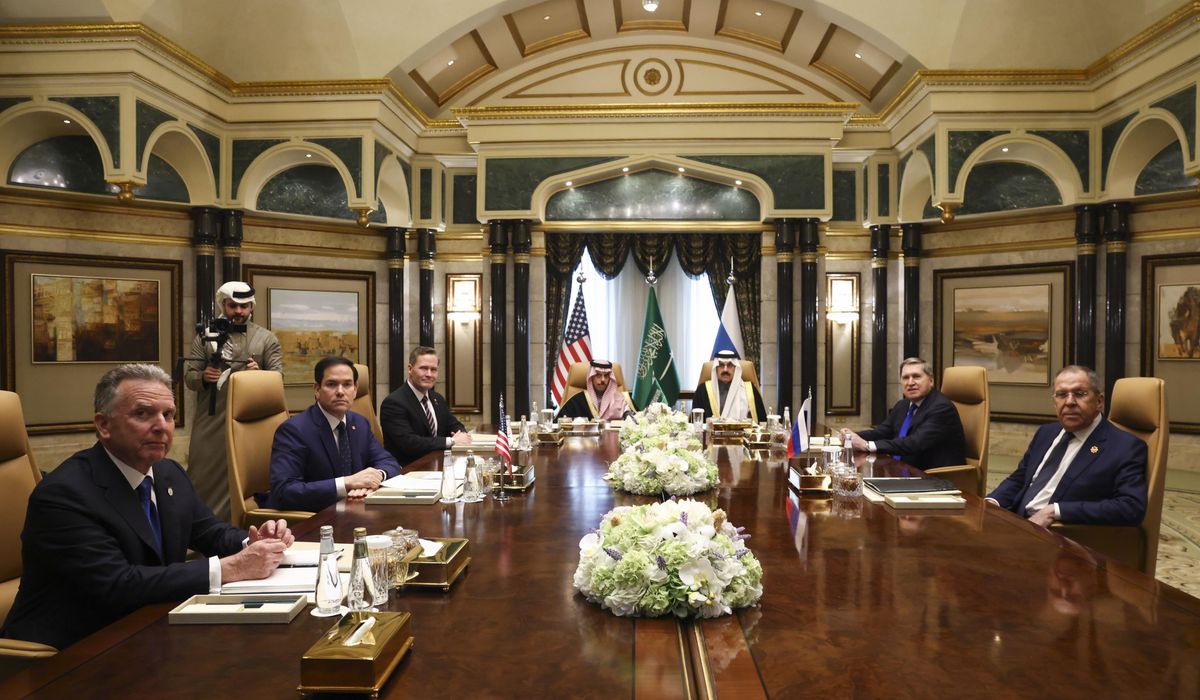


Teams led by Secretary of State Marco Rubio and his Russian counterpart met Tuesday in Saudi Arabia for the first face-to-face talks on ways to end the war in Ukraine, a sign of the dramatic change in American foreign policy following President Trump’s return to the White House.
With Ukraine not participating in the initial talks, both sides agreed to appoint high-level diplomatic teams to begin working on a path to end the war begun by Russia’s invasion of its smaller neighbor three years ago in a manner that is “enduring, sustainable and acceptable to all sides,” State Department officials said in a readout of the session.
Mr. Rubio was joined by National Security Adviser Mike Waltz and President Trump’s special envoy Steve Witkoff. Russian Foreign Minister Sergei Lavrov and Yuri Ushkov, an aide to President Vladimir Putin, made up the Russian delegation in the talks hosted by Saudi Crown Prince Mohammed bin Salman.
“President Trump wants to stop the killing. The United States wants peace and is using its strength in the world to bring countries together,” State Department spokesperson Tammy Bruce said in a statement. “President Trump is the only leader in the world who can get Ukraine and Russia to agree to that.”
Mr. Lavrov, speaking to reporters after the session Tuesday, called the discussions “very useful,”
The two sides “did not just listen to each other, but heard each other,” he said, adding there was a “mutual desire” to find an end to the war and that the U.S. and Russia planned “regular” follow-up meetings to build on the negotiations.
But the quickly organized talks have sparked widespread concern in Kyiv and capitals of Ukrainian allies across Europe, with some contending the Trump administration has already made unilateral concessions to the Kremlin even before real negotiations have begun. Russian forces still occupy about a fifth of Ukraine’s sovereign territory and Moscow has even formally annexed the Crimean peninsula and parts of eastern Ukraine into the Russian state.
Ukrainian President Volodymyr Zelenskyy has said he will not be bound by any negotiations where Kyiv is not present at the table. European leaders, including NATO members that have helped back Ukraine in its war against Russia, have expressed concern that the Trump administration has effectively sidelined them from the negotiations.
Mr. Waltz took issue with the criticism in speaking to reporters Tuesday, noting that Mr. Trump had spoken at length with Mr. Zelenskyy immediately after his phone call with Mr. Putin last week.
The U.S. “will continue to push back on this notion that our allies haven’t been consulted,” he said. “They’re being and they are being literally almost on a daily basis, and we’ll continue to do so.”
And Mr. Rubio said all the involved parties must sign off on any final deal.
“In order for a conflict to end, everyone involved in that conflict has to be okay with it,” he told reporters. “It has to be acceptable to them.”
Washington also is looking at the negotiations as a means to restore the frayed bilateral relationship between the U.S. and Russia. The White House says the talks can lay the groundwork for “future cooperation on matters of mutual geopolitical interest and historic economic and investment opportunities” that could emerge from an end to the conflict in Ukraine.
But Mr. Rubio and his aides have cautioned that it will take time to resolve all the issues in the largest land conflict in Europe since World War II. Mr. Rubio called Tuesday’s talks just the “first step of a long and difficult journey.”
“One phone call followed by one meeting is not sufficient to establish enduring peace,” Ms. Bruce said. “We must take action and today we took an important step forward.”
Both sides agreed to ensure the process moves forward in a “timely and productive manner” and establish a mechanism that will address “irritants” to the diplomatic relationship between Washington and Moscow with the ultimate goal of normalizing the operations of their respective diplomatic missions.
Mr. Lavrov in his remarks did lay down one new red line for any settlement, saying Russia would not allow troops from NATO nations to serve as part of any peacekeeping force in Ukraine if a ceasefire is reached. The British government has already said it is willing to provide troops for such a force.
“Any appearance by armed forces from the NATO countries under some flag, under the European flag or under flags, doesn’t change anything,” the longtime Russian foreign minister said. “It is of course completely unacceptable.”
• Mike Glenn can be reached at mglenn@washingtontimes.com.
